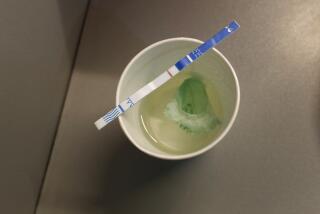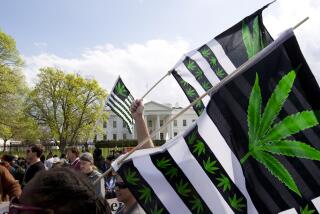This is your country on drugs
Ethan Nadelmann, president of the Drug Policy Alliance, visited the L.A. Times editorial board recently to discuss alternative approaches to America’s war on drugs. This is a partial transcript of that discussion.
Ethan Nadelmann, president, Drug Policy Alliance: If you consider the fact that a generation from now, there’s going to be a far greater diversity of drugs than there is today some of the legal ones, and probably illegal ones as well -- you think back a generation ago, and nobody had heard of MDMA, right? Methamphetamine was only used in a few pockets of the country Jump forward a generation from now, and you’re going to have a much, much greater diversity of these things being produced both legally and, quite possibly, illegally
Then the question becomes, What’s the best way to deal with this? If we continue on the current approach, it’s going to mean lock up more people, lock up more people, tougher penalties, sanction more physicians That’s been the trend line for the last 70 years
The alternative way is to say the only alternative here is basically to empower the consumers It involves providing as much information as possible about these drugs; it means that you either have a private equivalent of consumer reports on all these sorts of drugs; it means that you start to look at not just the divide between prescription-only and over-the-counter, but you look at what you might call behind-the-counter systems in other words, where you don’t need a prescription to get a drug, but the pharmacist makes a judgment call about whether or not to give this thing to you. You know, you talk about systems, for example, having to take a test I’ll give you example.
You want to go and get a drug? You don’t need a prescription; what you do need to do is pass a 10-point test about the risk of this drug You can take the test as many times as you want but what it does is it force feeds you, sort of, “I need to understand what this drug is about.”
Robert Greene, L.A. Times: Unless I want the drug regardless, the same way most people want illicit drugs regardless. So those channels would still be open, I assume
Nadelmann: There are no illicit channels now for, you know, or barely any for the valiums and all this sort of stuff, except sort of by diversion from the legal market. Nobody’s producing it illegally, right, because it’s so well relatively easy to get. The tougher it becomes to get a drug through illicit, illegal channels, the more likely you’re going to have underground production.
Look at the cigarette market Right now, still, there’s virtually no cigarettes being produced illegally, at least in the United States or almost any other country of which I’m aware. But you have this smuggling from low-tax places to high-tax states, but you don’t have it being produced illegally. The higher we make the tax, there comes a certain point at which all of a sudden, it starts to become financially lucrative to start to grow this stuff illegally and produce it that way If we go to full prohibition on cigarettes, which is something down the road one might imagine our society actually doing, which would be, you know, a terrible idea, you would then see a massive, global, you know, illegal tobacco model, with all the crime, violence, corruption and a transformation in the way tobacco is consumed. There would no longer be these filtered pack of 20; it would be, once again, people might smoke tobacco out of crack pipes, or things like that. It would change the form of consumption.
There’s something about prohibition also that tends to favor consuming a drug not always, but generally in more potent often more damaging forms. During alcohol prohibition, beer consumption virtually disappears, hard liquor goes up dramatically. Why? Al Capone doesn’t want to fill the trucks with something that’s 94% water and 6% booze; he wants it the other way around
Jim Newton, L.A. Times: If drugs were legal, would you expect that more people would do drugs ?
Nadelmann: By the definition of legal being treating it more or less like alcohol and cigarettes it’s highly taxed and regulated, but it’s generally available without a prescription my sense is that what you would see is more people using more different types of drugs with fewer negative consequences. And the reason you would see fewer negative consequences is because so many of the risks of drug use are associated with prohibition
Newton: There are some harms, though, associated with drug use that aren’t related to prohibition, addiction being the first one that comes to mind. Presumably, that harm would also be magnified if more people were taking heroin even if it were in regulated doses
Nadelmann: I think that the most powerful point to be made it’s the one my organization likes to put out there -- it’s not arguing that legalization is the answer, as if we know that with any certainty because we can’t know it we don’t know what would happen It’s to say that legalization, even more specifically prohibition, is the question that needs to be put on the table. It’s the question that needs to be on the table. And that the ways officials run away from that and can’t talk about it, won’t talk about it, that’s undercutting our ability for rational policy analysis in any sort of way, and it’s keeping us from trying to even imagine what would happen
The real question is not do we legalize or not; the real question is how do we most effectively reduce, A, the harms of drugs, and B, the harms of our prohibitionist policies. And the optimal drug policy is the one that’s most effective and reduces the harms of drug use and the harms of our prohibitionist policies. Some people would argue that the optimal policy is going to be legalization. Some people are going argue the optimal policy is still a form of prohibition but with much more public health woven in. I would argue it’s certainly some form of legal control of marijuana and a much heavier public health policy, but I don’t know about heroin, cocaine and full legalization.
Now to go to your specific question about what would happen with addiction, let me step back for a second Imagine writing an editorial where every time you use the world addiction, you write explicitly what you mean by that word right there, because you’ll find oftentimes that you’ll use the word addiction in the same piece to mean three or four different things without fully being conscious of the ways in which your definitions of addiction are changing as you write this thing.
Now I’ll give you my definition of addiction: Addiction equals dependence plus problems, by which I mean, you could be dependent on a drug you could be dependent on a cup of coffee every morning, you could be a diabetic who’s dependent upon insulin, you could be a former heroin addict who’s dependent upon methadone, you could be a person who quits smoking by using a nicotine patch or chewing gum and you’re still using that damn patch 10 years later. In all of those cases, you are dependent on that substance, but there are almost no negative consequences to the dependence to that substance
When you get a dependence plus problems, that becomes addiction. Now mind you, you can also have problematic drug use you can be someone who doesn’t use it everyday, but when you do you binge on cocaine or you binge on alcohol and do stupid and dangerous things. But it’s dependence plus problems that equals addiction
Greene: How does your approach to this stretch to things like methamphetamine, which is legal and available, at least in its raw material but can be turned into something a lot more lethal?
Nadelmann: Well, methamphetamine is always the hard case -- all stimulant drugs are in a way If you start to like a stimulant drug too much, cocaine or amphetamine, it can do harm to you more quickly than other drugs
Let me say this about methamphetamine: I think first of all, part of what we’re seeing in the media now and I don’t follow your writing about this closely is that we’re saying that anybody who uses methamphetamine is going to get f**ked up, basically, that the drug can’t be controlled. We’re saying about methamphetamine more or less what we said about cocaine before, about heroin before, about marijuana before, and even about alcohol back in the teens There’s an inherent bias about the way you cover some of this stuff. If a reporter is told to do a story on methamphetamine, and he says, “Do me a story on methamphetamine use in America,” and he goes out, where’s he going to go? Where are you going to find methamphetamine users easily? Jails. Treatment programs You’re going to look specifically at places where people who have a problem with methamphetamine are found. The people who are using methamphetamine without getting caught up in it or controlling their use or starting and stopping and what-have-you they’re not showing up in those two places. They also don’t want to talk to you.
So what we don’t know is among the world of methamphetamine users, what percent are the problem ones you find in the treatment programs and the jails, and what percent is the rest. Eventually what happens is after the craze passes the media craze passes in a way ethnographic studies appear five or 10 years later pointing out that the majority of people who have smoked crack did not have a problem with it, the majority of people who used heroin were in fact chippers, people who never became addicted, et cetera, et cetera. But that gets lost in the initial craziness.
It’s like saying to somebody, “Give me a story about alcohol in America or in Los Angeles,” and the reporter goes out and he goes to [Alcoholics Anonymous] meetings, detox clinics, skid row, what-have-you, and he comes back and he goes, “Here’s my story about alcohol” and the editor goes, “What are you talking about? What about the glass of wine I’m going to have with dinner? What about the 89% that don’t fit that?” So there’s a broad world of alcohol use. The same thing is true with methamphetamine use
With respect to stimulants, how you consume a drug makes a big difference. If you’re taking it orally, it’s different than smoking it, which is different than injecting it. Smoking and injecting get it into your blood at about the same rate, but each has significant risks they come in very fast. When you’re taking it orally, it comes in slower One of the things you see happening in England and I think in Switzerland, and now the mayor of Vancouver has proposed it, is taking people who are seriously caught up in smoking or injecting methamphetamine or amphetamine and seeing if we can get them -- if they can’t quit, if they keep going back what about shifting them over to oral?






